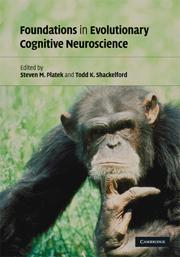| Listing 1 - 10 of 32 | << page >> |
Sort by
|
Book
ISBN: 1446242625 1446214869 1446257746 1283288788 9786613288783 1446203166 Year: 2009 Publisher: Los Angeles, [Calif.] ; London : SAGE,
Abstract | Keywords | Export | Availability | Bookmark
 Loading...
Loading...Choose an application
- Reference Manager
- EndNote
- RefWorks (Direct export to RefWorks)
This work introduces students to the core theories, approaches and findings that are the necessary foundations for developing an understanding of evolutionary psychology. It looks at how the theory is applied and covers evolutionary accounts of abnormal behaviour, language and culture.
Book
ISBN: 9780199231515 Year: 2009 Publisher: Oxford : Oxford university press,
Abstract | Keywords | Export | Availability | Bookmark
 Loading...
Loading...Choose an application
- Reference Manager
- EndNote
- RefWorks (Direct export to RefWorks)
Book
ISBN: 9780199561995 0199561990 Year: 2009 Publisher: Oxford Oxford University Press
Abstract | Keywords | Export | Availability | Bookmark
 Loading...
Loading...Choose an application
- Reference Manager
- EndNote
- RefWorks (Direct export to RefWorks)
Cognitive psychology --- Evolution. Phylogeny --- Cognitive psychology. --- Evolutionary psychology. --- Human evolution. --- Human remains (Archaeology).
Book
ISBN: 1599964481 9781599964485 9781599961675 Year: 2009 Publisher: Amherst, Mass. HRD Press
Abstract | Keywords | Export | Availability | Bookmark
 Loading...
Loading...Choose an application
- Reference Manager
- EndNote
- RefWorks (Direct export to RefWorks)
Toward Human Emergence is a helpful and positive analysis from a behavioral science viewpoint of various stages in our long journey from hunter-gathers and agriculturalists, to industrialists and technological advances, knowledge workers. It examines the why, what, and how for perfecting human endeavor within a global society characterized technological advances, knowledge expansion, and economic turmoil. This mind-stimulating volume offers a hopeful vision of humanity, so HRD practitioners and educators may inspire learners to utilize today's opportunities for improving the human condition an
Conscience. --- Process theology. --- Salvation. --- Manpower planning --- Civilization --- Evolutionary psychology --- Human evolution --- Progress --- Philosophy

ISBN: 9780511626586 9780521884211 9780521711180 9780511507274 0511507275 9780511505133 0511505132 9781139129626 1139129627 0511626584 1283330164 9781283330169 0521884217 0521711185 1107200296 9786613330161 1139134671 1139133543 Year: 2009 Publisher: Cambridge, UK New York Cambridge University Press
Abstract | Keywords | Export | Availability | Bookmark
 Loading...
Loading...Choose an application
- Reference Manager
- EndNote
- RefWorks (Direct export to RefWorks)
This book is an introduction to the emerging field of evolutionary cognitive neuroscience, a branch of neuroscience that combines the disciplines of evolutionary psychology and cognitive neuroscience. It outlines the application of cognitive neuroscientific methods (e.g., functional magnetic resonance imaging, transcranial magnetic stimulation, magneto- and electroencephalography, and the use of neuropsychiatric and neurosurgical patients) to answer empirical questions posed from an evolutionary meta-theoretical perspective. Chapters outline the basics of cognitive evolution and how the methods of cognitive neuroscience can be employed to answer questions about the presence of evolved cognitive adaptations. Written for graduate students and researchers, the book presents the major topics of study undertaken by evolutionary cognitive neuroscientists - such as language evolution, intelligence and face processing - and serves as a primer upon which to base further study in the discipline.
Brain --- Cognitive neuroscience. --- Evolutionary psychology. --- Psychology --- Human evolution --- Cognitive neuropsychology --- Cognitive science --- Neuropsychology --- Evolution. --- Cognition --- Cognitive Science. --- Neurosciences. --- Physiology.

ISBN: 9780809016471 0809016478 Year: 2009 Publisher: New York, N.Y. Hill and Wang
Abstract | Keywords | Export | Availability | Bookmark
 Loading...
Loading...Choose an application
- Reference Manager
- EndNote
- RefWorks (Direct export to RefWorks)
Shows how and why previous attempts to solve that problen have fallen short. Taking cues from topics as diverse as the foraging strategies of ants, the distribution of large prehistoric herbivores and the construction of ecological niches, Bickerton produces a dazzling new alternative to the conventional wisdom.
Psycholinguistics --- Human evolution --- Language and languages --- Origin of languages --- Speech --- Evolution (Biology) --- Physical anthropology --- Evolutionary psychology --- Human beings --- Origin
Book
ISBN: 9780691135540 9780691135533 0691135541 0691135533 Year: 2009 Publisher: Princeton, N.J. Princeton University Press
Abstract | Keywords | Export | Availability | Bookmark
 Loading...
Loading...Choose an application
- Reference Manager
- EndNote
- RefWorks (Direct export to RefWorks)
Philosophy of nature --- Ethics. --- Knowledge, Theory of. --- Philosophy. --- Evolutionary psychology. --- Morale --- Théorie de la connaissance --- Philosophie --- Psychologie évolutionniste. --- Théorie de la connaissance --- Psychologie évolutionniste.
Book
ISBN: 1282441299 9786612441295 1848163371 9781848163379 9781282441293 9781848163362 1848163363 Year: 2009 Publisher: London Hackensack, NJ Imperial College Press Distributed by World Scientific Pub.
Abstract | Keywords | Export | Availability | Bookmark
 Loading...
Loading...Choose an application
- Reference Manager
- EndNote
- RefWorks (Direct export to RefWorks)
This book delves into one of the greatest riddles perplexing modern science: "Why are humans so smart?" In a format understandable even by the non-expert, the author investigates the origins of human intelligence, starting with classical Darwinian concepts. Thus, the strengths and beauty of natural selection are presented with many examples taken from natural history. Common criticisms of Darwin, from scientists and non-scientists alike, are confronted and shown to be either inconclusive or outright false.The author then launches into a discussion of human intelligence, the most important feat
Intellect. --- Brain --- Human evolution. --- Evolution (Biology) --- Physical anthropology --- Evolutionary psychology --- Human beings --- Human intelligence --- Intelligence --- Mind --- Ability --- Psychology --- Thought and thinking --- Evolution. --- Origin
Book
ISBN: 9780521516990 9780511581366 9780521360890 9780511540721 0511540728 051158136X 0521516994 0511538111 9780511538117 1107191181 1282155628 9786612155628 0511540388 0511538944 0511539789 0521360897 Year: 2009 Publisher: Cambridge Cambridge University Press
Abstract | Keywords | Export | Availability | Bookmark
 Loading...
Loading...Choose an application
- Reference Manager
- EndNote
- RefWorks (Direct export to RefWorks)
What does it mean to be human? There are many theories of the evolution of human behavior which seek to explain how our brains evolved to support our unique abilities and personalities. Most of these have focused on the role of brain size or specific genetic adaptations of the brain. In contrast, in this text, Fred Previc presents a provocative theory that high levels of dopamine, the most widely studied neurotransmitter, account for all major aspects of modern human behavior. He further emphasizes the role of epigenetic rather than genetic factors in the rise of dopamine. Previc contrasts the great achievements of the dopaminergic mind with the harmful effects of rising dopamine levels in modern societies and concludes with a critical examination of whether the dopaminergic mind that has evolved in humans is still adaptive to the health of humans and to the planet in general.
Philosophy of nature --- Dopaminergic mechanisms. --- Brain --- Human evolution. --- Neuropsychology. --- Neurophysiology --- Psychophysiology --- Evolution (Biology) --- Physical anthropology --- Evolutionary psychology --- Human beings --- Sympathetic nervous system --- Evolution. --- Origin --- Health Sciences --- Psychiatry & Psychology
Book
ISBN: 9781402062865 9781402062872 Year: 2009 Publisher: Dordrecht Springer Netherlands
Abstract | Keywords | Export | Availability | Bookmark
 Loading...
Loading...Choose an application
- Reference Manager
- EndNote
- RefWorks (Direct export to RefWorks)
Scientists no longer accept the existence of a distinct moral organ as phrenologists once did. A generation of young neurologists is using advanced technological medical equipment to unravel specific brain processes enabling moral cognition. In addition, evolutionary psychologists have formulated hypotheses about the origins and nature of our moral architecture. Little by little, the concept of a moral brain' is reinstated. As the crossover between disciplines focusing on moral cognition was rather limited up to now, this book aims at filling the gap. Which evolutionary biological hypotheses provide a useful framework for starting new neurological research? How can brain imaging be used to corroborate hypotheses concerning the evolutionary background of our species? In this reader, a broad range of prominent scientists and philosophers shed their expert view on the current accomplishments and future challenges in the field of moral cognition and assess how cooperation between neurology and evolutionary psychology can boost research into the field of the moral brain.
Biological Evolution. --- Brain --- Cognition --- Cognitive neuroscience --- Cultural Evolution. --- Emotional Intelligence. --- Ethics. --- Evolution. --- Evolutionary psychology. --- Moralischer Sinn. --- Morals. --- Neuropsychology. --- Physiologische Psychologie. --- Localization of functions. --- physiology. --- Moral and ethical aspects.
| Listing 1 - 10 of 32 | << page >> |
Sort by
|

 Search
Search Feedback
Feedback About UniCat
About UniCat  Help
Help News
News